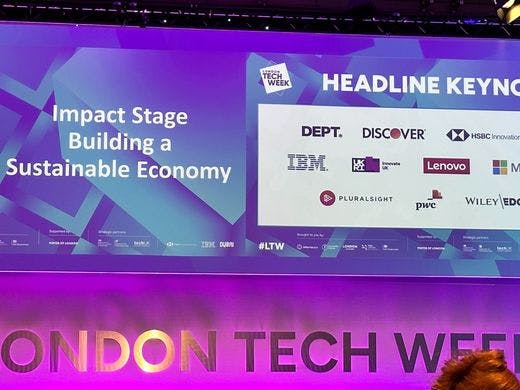This week, London Tech Week took over the Queen Elizabeth II Centre in Victoria. Founded in 2014, this annual event brings together global tech innovators, early-stage startups, policymakers, and thought leaders, serving as a platform to showcase ground-breaking advancements in technology and their potential to address pressing global challenges.
Unsurprisingly, the two hot topics were AI and Climate Change. This blog will focus particularly on the Impact Stage of London Tech Week – which was focused on the transition to a net zero economy, decarbonisation, biodiversity conservation, and the circular economy. Read on for our key takeaways, then check out True at London Tech Week - Unlocking Digital Potential here.
Clean Energy Revolution
A major theme discussed at London Tech Week was the critical importance of clean energy. It was highlighted that to meet the ambitious targets of the Paris Agreement, clean energy development must accelerate six times faster than the current rate. Solar energy, accounting for a mere 3.6% of global electricity production, offers vast untapped potential. With solar panels currently capturing only a fraction of the energy reaching the Earth during the day, scientists are exploring innovative solutions such as space-based solar energy collection. Exciting developments, like ultralightweight solar cells in Pennsylvania, showcase the promising advancements on the horizon. Moreover, the announcement that the UK Government has committed £4.3m into emerging space-based solar projects demonstrates a strong push for clean energy development.
Protecting Biodiversity for a Healthy Planet
The ClimateTech: The Business Case for Biodiversity session emphasised the vital importance of biodiversity conservation and its role as a crucial indicator of environmental health. Nature loss, responsible for 23% of global emissions, can also sequester more than one-third of those emissions. To address this issue, there is an expansion of nature-related legislation and agreements. A landmark achievement was the establishment of the Global Biodiversity Framework in December 2022, equivalent to the Paris Agreement, emphasising the urgent need for private financial flows to align with nature conservation goals. Countries and corporations are now setting targets and action plans for achieving net-zero and nature-positive outcomes. The economic significance of nature was underscored, as recent research found that 55% of global GDP is moderately or highly dependent on it (PwC). The health of nature directly impacts our ability to conduct business effectively.
Measuring and Monitoring Biodiversity
To effectively conserve biodiversity, accurate measurement and monitoring are imperative. Organisations like NatureMetrics showcased their work in this area, recognising the need to account for natural capital alongside traditional economic indicators. Satellite-enabled monitoring, as exemplified by Kayrros, provides a promising solution, although it requires complementary ground truth data for calibration. Additionally, innovative techniques such as DNA monitoring, portable labs, and artificial intelligence-driven pattern recognition were highlighted in Basecamp Research as crucial tools for understanding biodiversity changes and interactions.
Embracing the Circular Economy
The concept of a circular economy, which aims to minimise waste and maximise resource efficiency, garnered significant attention at London Tech Week. Greyparrot, an AI-based waste analytics platform, demonstrated how transparency and efficiency can be enhanced in recycling processes. Rethinking business models and improving waste sorting efficiency emerged as key strategies for promoting sustainability. Innovations like Notpla, which leverages the rapid growth of seaweed, showcased the potential for replacing single-use plastics. The event also emphasised the need for diversity and inclusion in the climate and circular economy sectors, recognising the significant contributions made by women and diverse founders.
'By short-changing women and diverse founders, we're short-changing humanity.' - Tessa Clarke - Co-Founder and CEO of Olio
Climate Tech's Time Is Now
In a thought-provoking address at the Graduation Day event, Paul Polman shared the urgent need for exponential transformation in tackling climate change. He stressed the importance of addressing issues of equity, ensuring that everyone feels they are participating in the solutions. Polman highlighted the recent findings from the Intergovernmental Panel on Climate Change (IPCC), which revealed the remaining carbon budget for a safe landing. The climate law, akin to Moore's Law, dictates that carbon emissions must be cut by 50% every ten years, an ambitious target. However, current trends show a deviation from this path, with emissions projected to increase by 10% this decade instead of decreasing by 45%-50%.
Last week, a new carbon budget was released, reducing the allowable emissions from 500 billion tonnes to 250 billion tonnes. This alarming reality highlights that our systems are becoming more fragile than previously realised, leaving us with a mere 6-7 years to make significant changes. Polman stressed the need to rethink business as usual, as our current efforts, though commendable, are still incremental and fall short of the exponential transformation required to combat climate change effectively.
Polman presented the concept of "The Earth For All," a visionary approach that begins with eradicating poverty and encompasses a global effort to achieve sustainability. He highlighted the increasing negative tipping points and the mounting pressure to find definitive solutions. The differentiation between companies that actively perform in addressing climate change and those that do not is becoming more pronounced.
Climate investing has now entered the mainstream.
With cost curves for climate technologies declining faster than expected, the best and brightest minds are increasingly drawn to this field. There is not only an urgent need but significant economic potential. Polman advocated for a shift from competitive leadership to collaborative leadership, as addressing climate change requires collective action and cooperation among stakeholders.
Looking towards the future, Polman emphasised the rise of mission-driven businesses and the importance of investing with impact. While impact investing, which trades impact for returns, has its merits, it is fundamentally limited in scalability. Investing with impact focuses on solutions that not only improve our lives but also make economic sense, ensuring long-term viability and sustainability.
London Tech Week served as a platform to highlight the urgent need for transformative action in tackling climate change, preserving biodiversity, and embracing the principles of the circular economy.
Get in touch with our Innovation team if you’re interested in learning more about the transition to a net zero economy, circular business models or investing into the innovators that are at the cutting edge of this topic.


